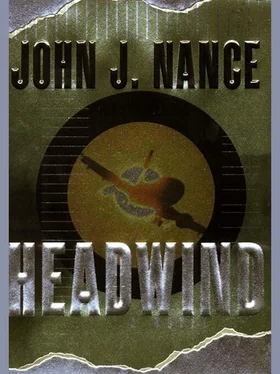David raised a finger in a “wait” gesture for a follow-up exchange with the controller.
He turned to Jay as he changed frequencies. “It’s our instrument clearance to Denver,” David explained.
“That’s the control tower?”
“No. There’s no tower here. That’s Denver Center. We take off on our own, then talk to them.”
Jay checked the tightness of his seat belt for the fifth time and forced his mind onto the more practical question of catching his transatlantic commercial flight in Denver. If it took an hour to get there, as David had said, he would have less than ninety minutes to get from the private terminal to the huge commercial terminal, buy his ticket, navigate the mysterious barriers the commercial industry always erected in the path of its customers, and board his flight.
“Laramie area traffic, Cessna Two-Two-Five Juliet November taking runway one two for departure to the south, Laramie.”
The sound of the engine revving to maximum power yanked Jay’s attention back to the present as the small Cessna leapt forward and began accelerating down the runway, bounding and swerving slightly on its spindly landing gear before David pulled on the control yoke and powered them into the air, leaving the concrete to drop away beneath them with sickening finality.
David banked the airplane to the southeast and leveled the wings as they climbed into the overcast sky and the world outside the windscreen became gray. Jay watched with growing alarm as the last images of pastures and ranch land and a westbound Union Pacific freight train disappeared below. His hands gripped the sides of his seat as he watched the pilot shift his concentration to the glowing instruments on the forward panel, adjusting the controls and throttle in accordance with the obscure and arcane things the instruments were telling him.
“This is some sort of black art, flying in weather!” Jay managed to say, his voice strained.
“Sorry?” David asked.
“I said… I don’t see how you’re doing this… flying blind, I mean.”
David reached up to change the radio frequency. “Denver Center, Cessna Two-Two-Five Juliet November, airborne Laramie, climbing one-two thousand.”
The movements of the small Cessna, the up-and-down and side-to-side bouncing and lurching became an accusatory voice in Jay’s ears screaming that he shouldn’t have pushed this young man to fly to Denver, regardless of the need to help John Harris.
“We are… right side up, right?”
“Yeah.” David chuckled.
“I can’t tell. I can’t read those instruments.”
Jay realized he had only one thing to hold onto: the reality that David didn’t seem to be panicked.
“It’s not that hard,” David said, his eyes boring into an instrument just in front of him. He turned and glanced at Jay and took his right hand off the throttle long enough to point to the round dial in the center of the panel.
“See this?”
“Yes, but are you sure you should let go of that?”
“Don’t worry. It’s okay. Now, that instrument is called an ‘ADI,’ Attitude Deviation Indicator. In the old days they called these ‘Artificial Horizons.’ What I’m doing is called attitude flying. See that little bar that looks like an airplane?”
“Yes.”
“Well, I keep the wings of that little artificial airplane level against that line that represents the horizon – my attitude, in other words – and it’s almost like flying on a clear day by visually looking at the real horizon.”
Jay tried to loosen his grip on the seat long enough to lean over and interpret what David had just said. He could see the horizontal bar within the circular instrument, and the little artificial airplane, but figuring out which way to push or pull the control wheel to keep the display in correct alignment was still a mystery.
“Then I watch my altitude, my heading, and my airspeed, and it all works,” David said.
The Cessna bounced through some sort of air current, and Jay felt himself being shoved upward as he heard the sound of the propeller change for a second, an alteration that caused what was left of his stomach to finish contracting into a singularity.
David refocused his attention on the so-called ADI, and Jay decided that distracting him with any more questions was a bad idea. He forced himself to focus on the legal battle ahead, and the question of where to send the President, if he could escape Italy.
“Denver Center, Cessna Two-Two-Five Juliet November, airborne Laramie, climbing one-two thousand,” David called again.
Still no answer, Jay noted, his concentration broken. “You doing okay?” Jay said, instantly angry with himself for saying another word.
“Yeah,” David Carmichael replied, hoping his passenger couldn’t see how nervous he really was. “We’re probably just not hitting their transmitters yet.”
David adjusted the throttle again and checked his altitude as he continued climbing through ten thousand. He looked out at the wing on the left side as casually as he could, checking for ice and relieved to see none. The outside air temperatures were probably too cold for icing, but there was a question in the Denver area.
David took a deep breath and realized his mouth was cotton-dry. They had ninety miles to go, and he had to do an instrument approach in a tiny airplane to one of the largest airports in the world, flying down to probably two or three hundred feet above the surface before seeing anything. He was also acutely aware of his inexperience as a newly minted instrument pilot with only six hundred hours of total flight time – and he hadn’t flown in nearly two months.
Carmichael, this was a stupid idea! he thought to himself, as he tried yet again to make radio contact with the controller.
“Denver Center, Cessna Two-Two-Five Juliet November, how do you read?”
What was it his instructor had said? The most important element of piloting an airplane was judgment, and he’d just exercised precious little of it by jumping at the chance to please a professor without really thinking through the risks.
This is an important mission! he argued to himself. It’s worth pushing the envelope.
But pushing the envelope was what killed people in aviation, especially pilots who flew beyond their experience or their capabilities.
He forced himself to take a deep breath and calm down, but his hand was shaking slightly on the control yoke, and the thought that he might be forgetting something was eating at him.
Oh my God, did I bring the approach plates for Denver?
Making an instrument landing required having the right pages aboard from a book full of such procedures. The “plates,” as the five-by-seven-inch pages were called, were packed solid with information about frequencies and minimum altitudes and headings and all the additional information a pilot needed to approach an airport safely without seeing the ground outside the windscreen until the last few hundred feet.
David felt his heart in his throat as he turned around. With no autopilot aboard the 172, he had to maintain control every second, but the brown leather, loose-leaf manual he needed – containing his Jeppesen instrument charts – sat where he’d placed it on the back seat. He reached around to grab it, pulling it back to his lap in time to realize he’d let the Cessna roll into a steep right bank.
He righted the airplane and held it steady while he flipped through the book with his right hand to find the ILS approach he needed for Denver International.
“Can I help you with that?” he heard Jay ask.
“I’m fine,” he lied.
Another unexpected gust shoved the Cessna to one side slightly, enough to cause a flutter in his stomach. He could imagine what Professor Reinhart was feeling.
Читать дальше












